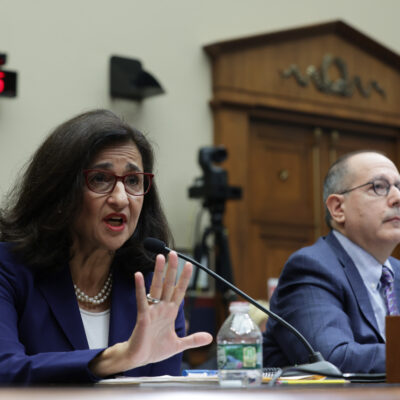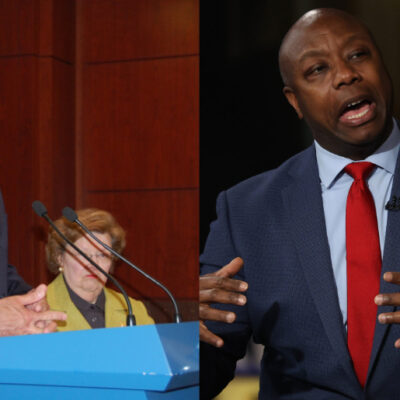Senators, outside experts urge stronger response to rising antisemitism, domestic terrorism
The Senate Homeland Security and Government Affairs Committee is holding hearings this week on domestic terrorism and violent extremism

Tom Williams-Pool/Getty Images
Sen. Jacky Rosen (D-NV)
Senators and outside experts urged the federal government to respond more forcefully and dedicate more resources to combating antisemitism and domestic terrorism during a Senate Homeland Security and Governmental Affairs Committee meeting on Tuesday focused on the rising threat posed by domestic violent extremists.
Sen. Jacky Rosen (D-NV) said she was “disappointed” that the administration’s recent domestic violent extremism threat assessment did not “account for the nexus between antisemitism and violent extremism.“
Paul Goldenberg, a senior fellow at Rutgers University’ Miller Center for Community Protection and Resilience and the former head of the Jewish community’s Secure Community Network, echoed Rosen’s concerns, emphasizing that antisemitism is “an absolute common denominator” between violent extremist groups on the left and right.
Sen. Josh Hawley (R-MO) specifically decried antisemitism linked to the recent conflict between Israel and terrorist groups in Gaza.
“It just simply can’t be that every time there is a conflict involving the State of Israel that it therefore becomes OK to attack American Jews, it becomes OK to engage in antisemitic conduct publicly. That just simply cannot be the case,” Hawley said.
He added, “Antisemitism in any guise, whether it’s from the right or whether it’s from the left, or whatever its excuse is, is wrong… We’ve got to be absolutely crystal clear about that.”
Expert witnesses offered a range of suggestions on how the government could respond to the rising trend of antisemitic violence and other domestic extremism.
Jewish Federations of North America President and CEO Eric Fingerhut repeatedly emphasized that funding for the Nonprofit Security Grant Program is “nowhere near” adequate and called for faith-based and nonprofit institutions to be designated as critical infrastructure, requiring the federal government to develop comprehensive plans for protecting the sector.
Rosen echoed Fingerhut’s concerns about NSGP funding, saying that “doubling the NSGP funding from $180 million to $360 million… is critical to meeting the growing needs of the program to keep all of our communities secure.”
Fingerhut also said that many nonprofits and faith-based organizations lack “the knowledge and the skill and the ability to fulfill the technical requirements of the [NSGP] applications.” He urged the federal government to increase its efforts to assist organizations to make the process smoother.
Wade Henderson, the interim president and CEO of The Leadership Conference on Civil and Human Rights, repeatedly noted that the federal government has significant resources to address domestic terrorism, but lacks “the political will.”
“The biggest issue that we have before us is how do we encourage the federal government and the appropriate agencies to use the tools at their disposal to prosecute domestic terrorism in an appropriate way,” he said.
Goldenberg suggested that the Department of Homeland Security choose a point person to address violence against faith-based communities and unite efforts across the massive department.
“The initiative really needs to have ownership,” he said. “Someone at a very senior level that could transverse across all the various divisions and departments and offices that really focuses on this issue.”
Goldenberg further argued that law enforcement agencies at all levels have systematically failed to respond adequately to online threats against Jewish and other communities. He said that authorities need to work to more clearly define when such threats violate the law, when investigations can be opened and who should be handling such investigations.
“Take a look at how many cases have been opened up where someone has been threatened over the internet and there’s absolutely nowhere to go with it,” Goldenberg lamented. “You don’t even know what agency to report it to. These are the things that I think we need to be very focused on.”
Sen. Rob Portman (R-OH), the committee’s ranking member, echoed Goldenberg’s concerns.
“Some of the frustration out there is that you have these threats that are real and yet there doesn’t seem to be an easy way for law enforcement, at the local state or federal level, sometimes to respond,” he said.
Henderson also urged Congress to strengthen the Hate Crimes Statistics Act of 1990, which requires the Department of Justice to collect data on hate crimes. He said that federal data on hate crimes is “incredibly incomplete” because most law enforcement agencies do not participate in the voluntary reporting process. Such reporting, he said, should be made mandatory, and the federal government should also educate law enforcement agencies and communities nationwide on how to identify, document and report hate crimes.








